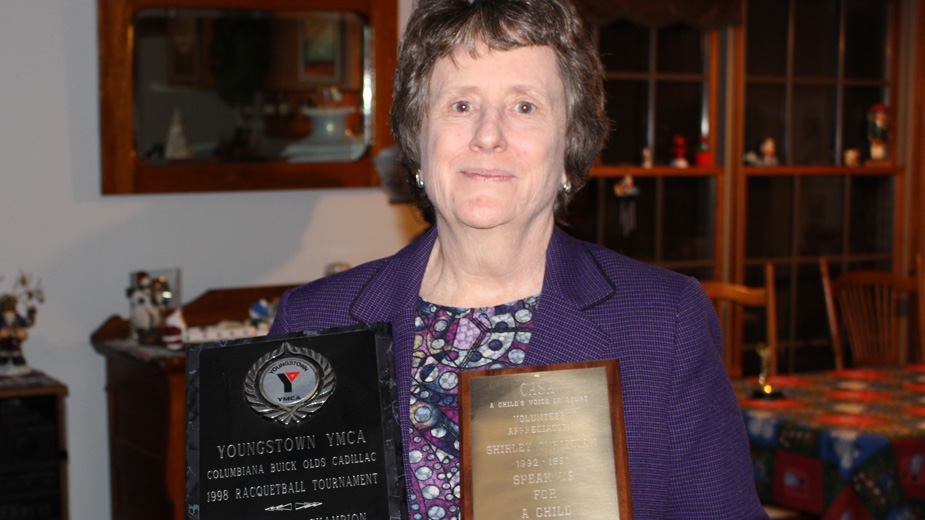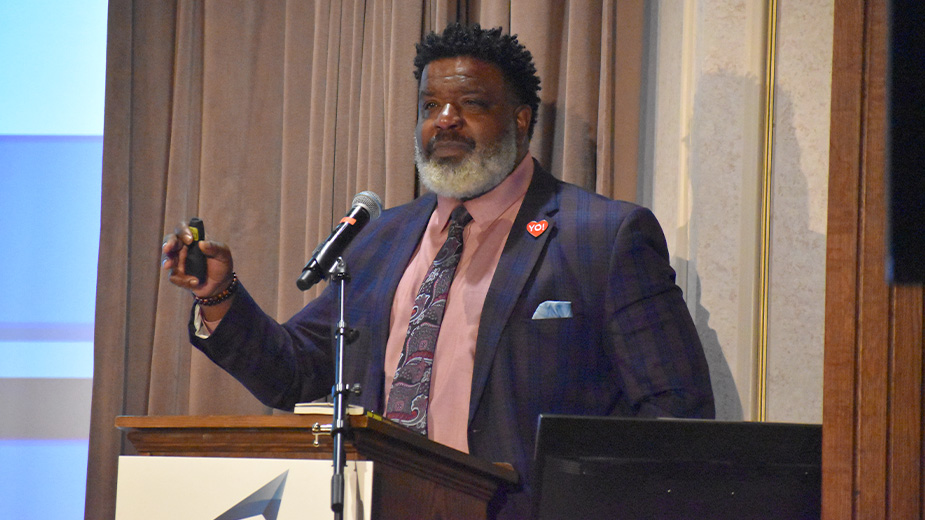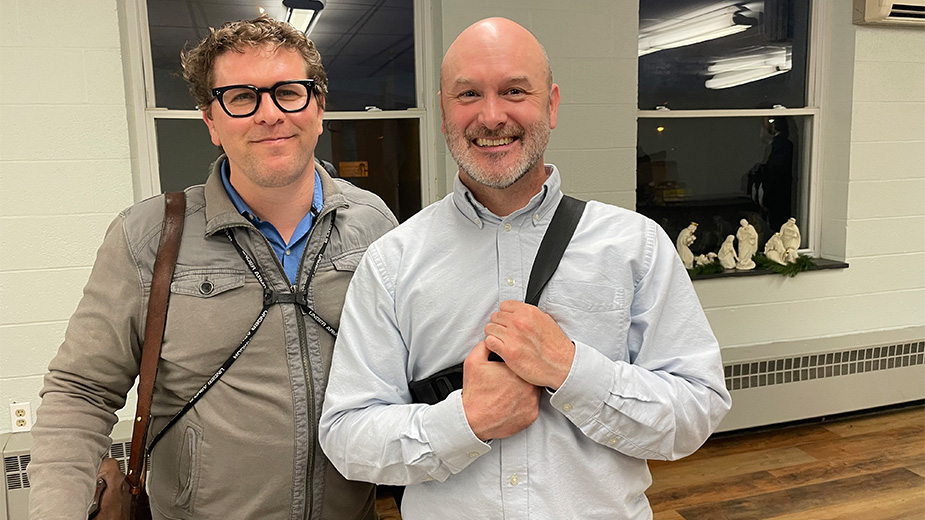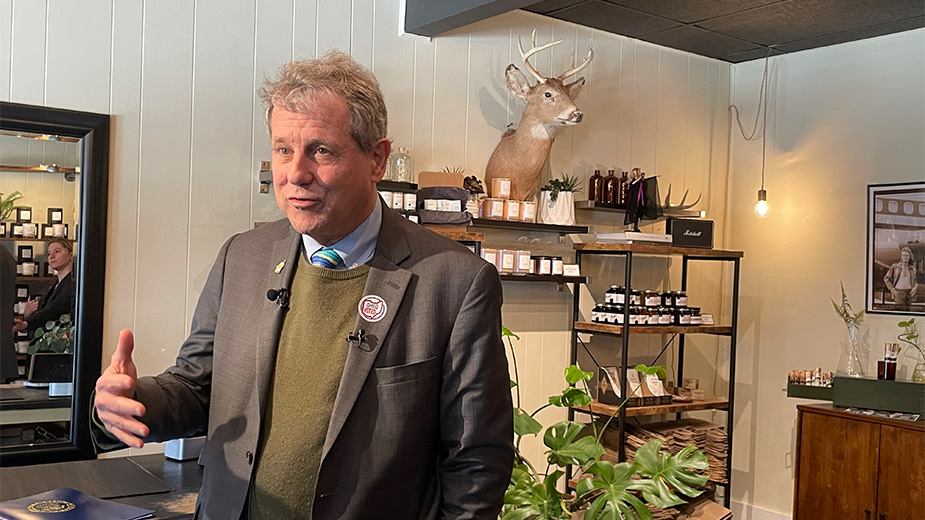‘Most Intriguing’: From Phys Ed to Law to Judge
YOUNGSTOWN, Ohio – It was a case early in her career as an attorney, Judge Shirley Christian remembers, that in many ways best reflects both her character and competitive nature.
“There was this one occasion when a judge brought me in – it was actually my first jury trial – and he told me I had to settle this case,” Christian says. “He said, ‘You’re not wasting my time on this case. Get on the phone and call your client.’”
She did just that. As she suspected, her client – the defendant in the trial – affirmed he would not back off. The judge, visibly irritated by the refusal, ordered the jury to come in and hear opening statements by the plaintiff’s attorney.
Once the attorney finished his remarks, the judge took Christian aside. “Did you hear his opening statement? You’re going to lose this case,” she recalls the judge saying, without having heard her opening argument. Again, the judge advised the young attorney to convince her client to settle. Once more, the client refused, and the trial proceeded as scheduled.
“A long story short. The jury comes in and gives a verdict in my favor,” Christian says. As for the judge, “I just kind of sat there and smiled at him.”
It was a valuable lesson for the lawyer: Never be intimidated by anything you choose to pursue in life. Play by the rules.
Indeed, just about everything Christian has achieved she credits to her competitive nature, first formulated through organized sports as a young woman growing up in Erie, Pa.
Education, work, leadership, her rise as a successful attorney in one of the Mahoning Valley’s most prestigious law firms, and eventually her successful effort to be appointed to the Mahoning County Court of Common Pleas, she says, are all grounded to some degree in athletics.
“I come from a sports background,” Christian says as she sits on a couch in her front room along with her husband, attorney Robert Christian, at their house in Springfield Township. “I played volleyball, basketball and softball.”
Her father worked at the General Electric plant in Erie, where he tested diesel electric motors as they came off the line. Her mother was mostly a stay-at-home mom who cared for six children. Shirley was the second-youngest.
Upon graduating from high school, Christian enrolled at Edinboro State College, today Edinboro University of Pennsylvania. “I went to college on a work-study program,” Christian recalls. “There were no scholarships.”
Nor was there much of a sports program for women, the judge says. “At Edinboro, there was no intercollegiate softball team.” To fill this void, she and her sister embarked on a recruiting campaign to find a coach, then petitioned student government for recognition and was successful in having the softball program commissioned as a club sport. The next year, Christian applied for intercollegiate status and again was successful.
While at Edinboro, Christian excelled in softball, basketball and volleyball. She was graduated with a bachelor’s degree in physical education and then pursued a master’s degree in educational psychology. After Edinboro, she accepted a position at Villa Maria State College, an all-women’s college in Erie as its athletics director and basketball coach. “It was a very academic-oriented environment,” she says. “It was an 800-student school, and we had very few come out for the team.”
One year, Christian says, Villa Maria’s basketball team consisted of just 10 players. That number was trimmed to eight after Christian caught two players cheating and threw them off the team. “Picture a basketball team trying to practice with eight people – we recruited a priest and an English professor to help us practice,” she says with a laugh. The one crowning achievement of that year, she adds, was, with just eight players, the school’s 101-100 victory over Erie rival Mercyhurst University.
“I tie a lot of my development as a lawyer to that whole competitive experience,” Christian says.
The jurist spent six years as the Villa’s athletics director. She felt that the athletics program wasn’t achieving its objectives, however, and subsequently formed a task force to ascertain whether it was feasible to move forward with the sports program. “It just didn’t appear to me that it was working out.”
The task force agreed, and Christian discovered that she had just talked herself out of a job. Knowing that she would soon be unemployed, Christian met with the school’s guidance counselor, who suggested that she consider law school. “I had never even met a lawyer before,” she says.
Regardless, the following year she found herself at Ohio Northern University Claude W. Pettit College of Law in Ada.
“I paid my way through law school with loans and jobs,” Christian says, noting that she simultaneously worked as a library assistant, a research and writing assistant, and during the evenings conducted inventory for nearby grocery and retail stores. During the summers, Christian worked at GE, a plastics plant, and a frozen food factory.
“I learned from that,” she remembers. “It’s a valuable experience to know what it’s like to be on your feet eight or 10 hours a day.”
All of this helped prepare her for a career in law, Christian notes. After graduation, she applied for a position at what then was Harrington, Huxley, Mitchell and Smith in Youngstown – now Harrington, Hoppe & Mitchell Ltd. “It was at the height of the med-mal [medical malpractice] crisis, and they wanted an attorney to help with that,” she recalls.
It appeared a good fit because of her undergraduate degree and professional experience focused on health and physical education, relates Eldon Wright, the now-retired attorney who hired her in 1988 fresh out of law school.
“Two things stood out,” Wright recalls. “One of the things that impressed me was her history of competitiveness. It was important to know that she was a competitive person.”
The second factor was her academic and professional background, Wright says. “She had taken a lot of courses in anatomy, which was important since a lot of our cases involved physical injury or emotional problems. We needed someone conversant in this.”
Thus began Christian’s career in the medical malpractice field – representing hospitals, physicians and employees. “I did that for 28 years and that’s where the competiveness comes in,” she says. “I love the battle.”
Her husband, Robert, an attorney who runs a sole practice from his office in the Huntington Bank Building downtown, says he’s very accustomed to her competitive nature. However, even he was taken aback when Christian came home one evening and informed him that she wanted to seek the appointment to the Mahoning County Court of Common Pleas to complete the term of Judge James Evans, who retired Oct. 1, 2014.
“She surprised the dickens out of me,” Robert Christian says.
The judge says that her decision grew from a desire to see that position filled by someone who possessed the experience necessary to do the job. “I thought, ‘I’ve got the experience. I’ve got recommendations. I served on the board of governors of the state bar association,’ ” not to mention serving as the second female president of the Mahoning County Bar Association, she says.
So, Christian sent in the required documentation and applications, and in August 2014, Gov. John Kasich appointed her. “I didn’t know the governor and the governor didn’t know me,” she says.
Christian, a Republican, is seeking election to the seat this year in a region that elects far more Democrats than Republicans. And, despite her level of comfort when it comes to a good fight, she is still learning the ropes of what it takes to run for elective office. “Politics is a different animal,” she says. “Having to go out and talk about myself is something I never did. It’s a transition, but a necessary one.”
A judge’s political affiliation should have no bearing on the bench, she says. “Judicial races are and should be different. My political views are not relevant to what I do, and they shouldn’t be.”
Moreover, managing the transition from attorney to judge has gone much more smoothly than she initially thought, she notes. “It’s not been difficult,” she says. But what’s different is that she no longer competes in court. Instead, she combines all of the legal knowledge and procedures she learned and practiced over the years with her experience in athletics.
She compares her role as a judge to that of a referee. “Here are the rules that everybody plays by. I call them as I see them,” she says.
In their free time, the Christians enjoy golfing and traveling together, Robert says. “We love to travel to museums and parks,” he says. “We spend most of our Sundays after church just driving around a little bit – Trumbull County, Columbiana County, or into Pennsylvania – just to see things we’ve never seen before.”
The two met in 1988, the year Judge Christian began her law career at Harrington, Robert recalls. Judge Theresa Dellick, then an attorney at Harrington, stopped him on the street and asked whether he’d like to meet the new attorney in her office. “I said yes,” he relates, “but didn’t do anything about it.”
A few weeks later, Dellick called his office and chided him about not showing up, warning that another suitor was coming to meet her in an hour, Robert recalls.
“So, I went up the three floors to their offices and knocked on her door and said, ‘Theresa thinks we should meet.’” They married in 1990.
When not on the bench, Christian says she enjoys reading – novelists such as James Patterson and John Grisham are among her favorites – and recently finished Garth Stein’s Racing in the Rain. Other activities are membership the Lions Club, walking and working in her garden and contributing to organizations such as the United Way and Catholic Charities.
“I’ve known Shirley personally for over 25 years,” says Nancy Voitus, executive director of Catholic Charities. “She’s one of the most genuine, down-to-earth people that I know. Everybody who meets her is struck by how genuine she is – and smart.”
The judge is very active with Catholic Charities and other organizations across the community. “She’s good for advice and to bounce problems off of,” Voitus says. “And she’s always looking as to how she can give back to the community.”
Despite a busy schedule, the judge is active with programs that she believes important to further the study and practice of law. One is the Lawyer to Lawyer Mentoring Program, administered by the Supreme Court of Ohio.
For the past five years, Christian has served as a mentor for new attorneys – one per year – who are asked to read certain materials and engage in dialogue with her on a menu of topics related to the law. Throughout the program, these issues have included socio-economic matters, the politics of law firms and the economics of law firms.
“It’s a two-way street,” the Christian says. “I learn a lot from them. It helps me stay grounded as to what people are learning and what their concerns are.”
And it’s vital for young attorneys to understand the importance of the law and the charge of standing your ground, Christian says. She recalls a case where a former employee sued a small employer, alleging that she was fired because of her age. “They were scared to death,” she says of the owners, a husband-and-wife team who stood to lose everything.
Christian worked with them – especially the wife – through the deposition, going through the facts of the case and evaluating whether age was a factor in the employee’s dismissal. “I had to build up her confidence to explain why the employee was fired.”
Once the client finished her deposition, Christian asked for a summary judgment, which was granted in the defendant’s favor.
Christian has litigated cases where millions of dollars were on the line, but this particular case often returns to her mind as to why the law is important.
“From a personal standpoint, this was very gratifying to me because I was her support through that entire process,” Christian says. “For me – and for her – this was high stakes.”
Pictured: Judge Shirley Christian holds two awards, one for her athletic prowess, the other for her work on behalf of children.
Copyright 2024 The Business Journal, Youngstown, Ohio.



